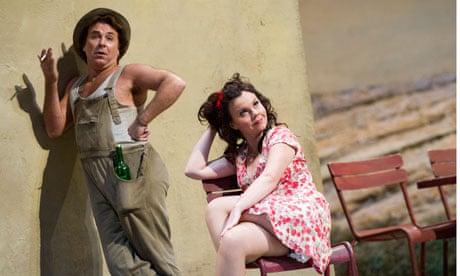Many a furtive tear has sprung to my eye at the prospect of sitting through a performance of L'elisir d'amore, but not quite in the way Donizetti intended in the opera's most famous aria. The pining Nemorino is convinced that a quack doctor's cheap red is indeed the promised elixir of love. Tormented, optimistic, he breaks into Una furtiva lagrima, the emotional nerve centre of the score.
From the weighty opening chords, to the military march and Nemorino's heartfelt cries of misery, it's mock heroics all the way in L'elisir, now back at the Royal Opera House in Laurent Pelly's 2006 production, starring a gym-fit Roberto Alagna who, two decades after first singing the role, still leaps over hay bales with the agility of a mountain goat. We'll come to his voice later.
All this theatrical solemnity is spiked with Donizetti's jubilant amalgam of high sentiment, patter-song wit and smiling outpourings of melody. L'elisir is that old story of the wily mountebank who peddles promises to the desperate poor. The village numbskull wins his chilly, brainy Adina in the end, not least thanks to the alchemy of money. It's always described as fun. Give me a gloomy Bruckner symphony any day.
Of course – yes really – it does on occasion turn out to be the souffle Donizetti intended. Comic timing, singing, acting, playing can make this well-crafted opera rise to airy brilliance. There were many glimpses of buoyancy in the ROH staging, updated to 1950s Italy but with a hint of Grant Wood-style American pastoral'n'pitchforks irony in Chantal Thomas's designs.
Bruno Campanella, conducting, maintains pliant, relaxed speeds, which are preferable to the urgent tempi some of his colleagues favour, when the music is whipped so hard in a quest for sparkle it falls flat. On Tuesday, notwithstanding a few first-night judders, the score had spaciousness and poise. Prominent solos, from flute, harp and bassoon among others, were dispatched with suppleness.
Pelly turns the work's brittle nature to his advantage by choreographing the action like low-level dressage: the (excellent) chorus move as one, to amusing effect. The joyful, giant presence of Ambrogio Maestri as Doctor Dulcamara, a vision in raspberry pink suit and white loafers, towers over the stage, dominating all with the mere opening and closing of his arms. His voice, too, is outsize and triumphant. A recent Falstaff at ROH, he is a bonus to any show.
The Polish soprano Aleksandra Kurzak, returning to the role of Adina, repeats a witty routine of crossing her fabulous legs and pulling down her short skirt countless times as she primps and preens in the opening scene. She inhabits the role with pert physicality and much flashing of eyes and flicking of hair, though the voice is uneven, pale in important top notes but generally secure everywhere else.
So to Alagna, the French-Sicilian who long ago – around 1990 – proved that there were more than three tenors in the world. Dressed in oversize dungarees and pork-pie hat, he gives a stunning performance: boyish, lyrical, acrobatic and touching. To point out that his voice cannot sustain the long, ardent lines as once it did, or to observe that in one instant the sound disappeared altogether on a high note, hardly deserves gold stars for perspicacity. This generous performer gives his all and we share in the collective memory of his career, past and continuing. Given his opera's-Posh-and-Becks celebrity as the other half of the Romanian diva Angela Gheorghiu, he hasn't always won proper credit for his artistry. Passion and risk win over precision on the operatic stage.
The annual Bath Mozartfest, by no means limited to the music of its inspiring genius, has an imaginative remit. One of the opening concerts, performed by Paul McCreesh and the Gabrieli Consort & Players under the soaring fan vaulting of the abbey, acted as a prelude both to Britten's forthcoming centenary and to his 99th birthday and St Cecilia's day this Thursday. The patron saint of music shaped the programme, with Britten's Hymn to St Cecilia at its heart, vivid and fresh, and an uplifting account of Purcell's Hail! Bright Cecilia to conclude. Ornaments and embellishments, a tenor who can fly up to falsetto (Charles Daniels) and some fantastical word painting, especially on the words "with leafy wings they flew" in a duet between two trees, display this 1692 ode as a supreme example of high baroque.
In Bath's Guildhall, violinist Erich Höbarth and pianist Susan Tomes played five of Mozart's Sonatas for Piano and Violin. As their title suggests, the piano has the star role here and however respectful one is to Mozart, the violinist gets decidedly short shrift. Höbarth, a member of the period instrument Quatuor Mosaïques, was gentlemanly in his accompaniment of the pianist's trills, arpeggios and cascades of notes, executed with unshowy elegance by Tomes, but the balance was rarely in his favour except perhaps in Variations II and III of K379. It would have been good to hear the B flat Sonata, K454, which opens with big chords for the violin and then takes off with a rapid allegro, showing who's in charge. (As a violinist – of sorts – you'd expect me to make such remarks.)
In a packed Wigmore Hall and live on BBC Radio 3, another duo, Gautier Capuçon and Gabriela Montero, demonstrated the easier balance of cello, bigger in tone and volume, and piano in works by Beethoven, Schumann and Grieg. As an encore, they offered their own poignant version of Rachmaninov's Rhapsody on a Theme of Paganini. You may shed a furtive tear or two yourself.

Comments (…)
Sign in or create your Guardian account to join the discussion